Tag: Christopher Columbus
bookmark_borderFantastic news re: President Trump and Christopher Columbus
No comments are really needed, other than to say that this is completely awesome. The reason why I voted for Trump is because of the prospect that he would make a statement / take a position exactly like this one. To some extent, the Trump administration hadn’t stood up for statues and historical figures to the extent that I hoped they would, instead focusing on other issues, but this makes me feel much more positively about the situation. Thank you, thank you, thank you.
View this post on Instagram
View this post on Instagram
View this post on Instagram
View this post on Instagram
View this post on Instagram
View this post on Instagram
View this post on Instagram
White House Facebook post here
Fox News Facebook post here
bookmark_border“Faith Lift” column about Christopher Columbus
Check out this positive article about Christopher Columbus – a rare thing in today’s society. Written by Canadian pastor and columnist Rob Weatherby, it outlines six types of danger that Columbus faced and triumphed over: the risk of encountering sea monsters and/or falling off the edge of the earth (both considered serious possibilities at the time), the risk of violent storms, the risk of running into a wind-free spell and getting stuck, the risk of encountering rival Portuguese explorers, the risk posed by hostile native tribes, and the risk of mutiny by his own crew.
As the author points out, these factors “underscore the immense courage of Columbus.” Sadly, to many people in our society, courage such as that which Columbus displayed, is not valued. Being remarkable, standing out, and doing magnificent things is not valued. Instead, the only thing that is valued, for so many in our society, is compliance, sameness, and mindless conformity. That is what is motivating the atrocities that have been committed against Christopher Columbus over the past five years.
bookmark_borderYou know what’s “pure hell,” Tim Walz?
According to Fox News, Minnesota governor and vice-presidential candidate Tim Walz described he and Kamala Harris’s loss as “pure hell” and said that Democrats are “fatigued.”
You know what’s pure hell? Watching the man that you love be lynched. Seeing the noose tightening around his neck, and the mob of angry bigots pulling on the rope. Hearing the sickening thud as his massive bronze body falls to the ground. Watching his murderers celebrate their “accomplishment.” Watching them stand on the pedestal where the man you love stood just seconds ago, their hands raised in sickening triumph. Watching them pose for pictures with their knees on his neck as he lies, pitifully, face down on the pavement.
Seeing police officers lined up, off to the side, watching this horrifying scene unfold, doing nothing to intervene because they were instructed not to. Hearing this atrocity – a demonstration of pure hatred for you because you are different from the majority – characterized as “understandable” and an act of “civil disobedience.” Hearing that the main perpetrator was released with no punishment, and that the other perpetrators weren’t arrested or charged to begin with.
Having to somehow continue existing, year after year, in a society that considers the above scenario to be completely acceptable. A society that doesn’t care about your pain, that doesn’t care about your feelings, that doesn’t care about your viewpoint, that doesn’t care about your perspective.
This is pure hell, Tim Walz. This is what I’ve experienced. And you caused it.
bookmark_borderA beautiful day in Boston with Christopher Columbus
Christopher Columbus is happy today.
I could tell when I visited him.
Being a statue, he can’t exactly change his facial expression to reflect what he’s feeling. And I’m well aware that most people would say that he isn’t capable of feeling anything at all. But as someone who loves statues more than anything else in the world, and statues of Columbus in particular, I believe in the idea that a statue can feel happiness. Call me crazy, but I believe that on some level, Christopher Columbus knows about the election result and is pleased with it.
As mentioned above, I decided to visit Christopher today. I had been in a dark and negative headspace regarding his situation, as detailed in this blog post. But with the hope and lightness that the election result brought, I was in the mood to make another trip into the North End to see my favorite statue.
And I’m glad that I did so.
Before even boarding the train, I was beginning to regret my decision. It was one of those days that is relatively warm, but extremely windy. As an autistic person, this severely bothers my sensory sensitivities. Within the first few minutes of waiting on the train platform, I was frozen to the bone and in agony. I was wearing a light sweater due to the fact that the temperature (according to the weather app, at least) was 67 degrees, but I was soon wishing that I had worn a down parka and ski mask. After what felt like an eternity, the train arrived, but it apparently didn’t pull into the station correctly and had to back up a couple of feet, costing additional minutes. Finally, I was able to board the train and therefore to get a reprieve from the ice-cold wind.
Once in Boston, my way was blocked numerous times: by people plodding along the narrow sidewalk, by a chaotic intersection at which a truck was trying to turn but none of the cars would allow it to, and by a gaggle of tourists hanging out near the entrance to the Peace Garden of St. Leonard’s Church.
But once I stepped through the gate of Chris’s new home, the Peace Garden lived up to its name. Gentle music wafted through the air. The biting cold wind ceased. A wide brick path led through the garden, with a delicate-looking fence and elegant lanterns on either side, toward the entrance of the church. To my left were two statues: one of Jesus on the cross and the other of Mother Mary with children gathered around her. To my right were four statues: one of a saint with his arms raised in the air, one of a kindly-looking man surrounded by children, a gold-colored fellow with outstretched arms, and Chris. He stood tall with arms crossed over his chest, as always. Beautiful rosebushes had been planted around his pedestal. The trees cast shadows across his marble face, and their golden leaves drifted softly down to blanket the grass. The sun’s rays cast a warm glow over the peaceful scene.
A few people trickled into the church for a mass that was starting soon, but for the most part, the garden was deserted, allowing me to spend a few minutes with Chris undisturbed. I didn’t actually talk to him, because that would’ve made me look completely insane, but I admired him, took some photos, and sent my thoughts to him telepathically. (I guess that sounds kind of insane too, now that I think about it.)
Hi Chris, I greeted him. It’s me, Marissa. Do you remember me? I came back, like I promised I would. No matter where you go, I will always find you. I will always come back. I will never forget about you. Are you happy in this place? You look nice here. It is peaceful and beautiful. Did you hear the news? Do you feel happy about it?
As crazy as it sounds, I knew that he did remember me, and that he was happy, about both his home and the election results.
Once I had assured myself of this, I took a closer look at the church building itself, a mosaic displaying the names of its benefactors, and a new sculpture called the Noble Journey, which shows footprints of various sizes representing immigrants coming to America. And then I turned and walked slowly back down the brick path and into the bustling, congested streets of the North End.
Bye Chris, I thought as I looked back over my shoulder. I’ll be back. Until next time…
Here are some pictures that I took of Chris, his friends, some other things in the Peace Garden, and a couple of other miscellaneous pieces of public art in Boston:
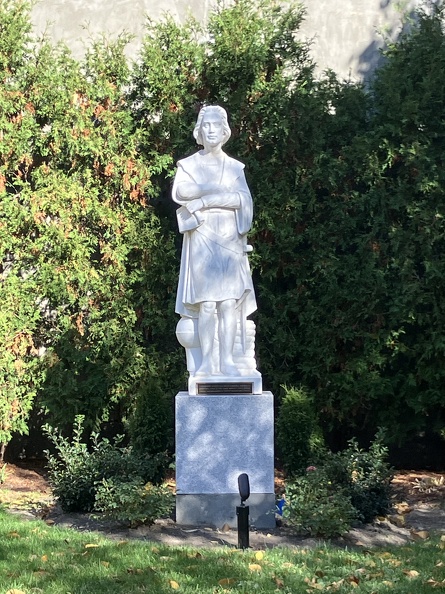

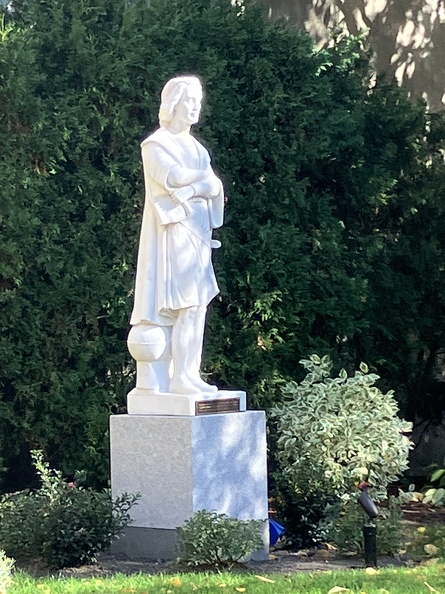
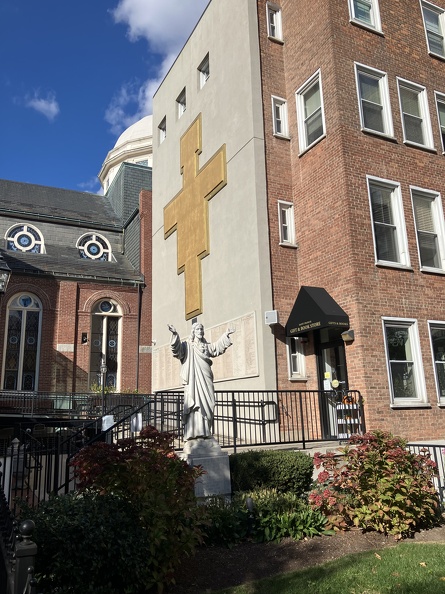

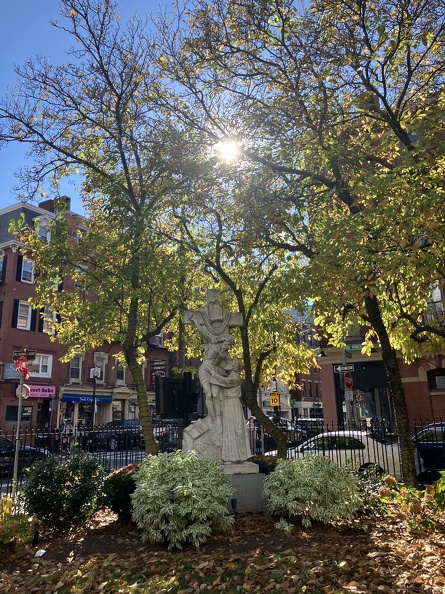
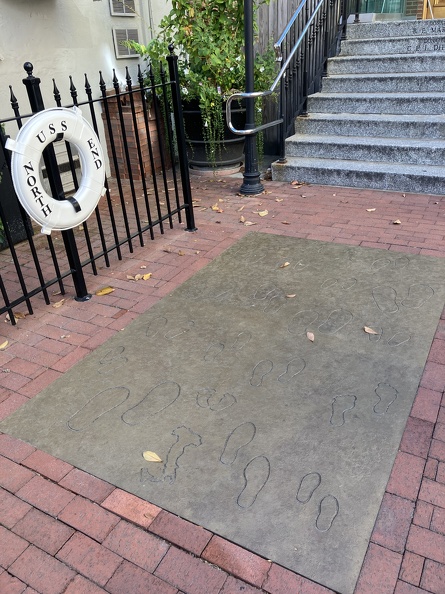

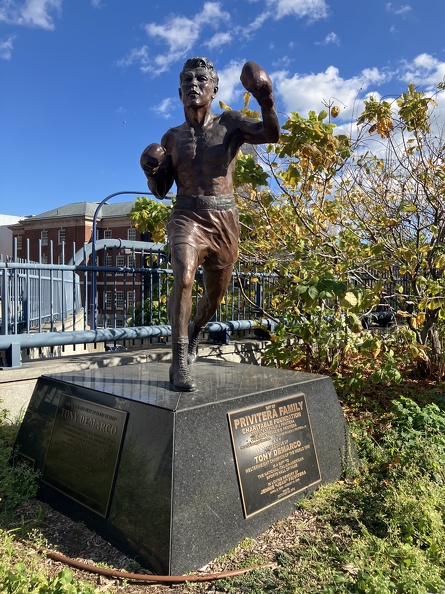

You can view all of my pictures of Chris at St. Leonard’s here. This album also includes the pictures that I took when I visited him for the first time there in September, which I wasn’t in the right headspace to post about at the time.
bookmark_borderA beautiful day
I am happy today.
This is the first time in my life that I have voted for a presidential candidate who won. In 2008, the first year I was eligible to vote, I voted for libertarian candidate Bob Barr. In 2012, I voted for libertarian candidate Ron Paul. In 2016, I voted for libertarian candidate Gary Johnson. I was happy that Trump won, and definitely preferred him to Hillary Clinton, but due to the fact that all of Massachusetts’s electoral votes are basically guaranteed to always go to the democratic candidate, I continued my tradition of voting third party. In 2020, I voted for Trump, and he lost. In 2024, I voted for Trump and – it feels both strange and amazing to type these words – he won.
View this post on Instagram
It is a beautiful day. Things feel lighter, more hopeful. I feel that I can breathe again. A noose is no longer tightening around my throat, the heavy boot of tyranny no longer stomping on my face. For four years, I never thought that this result would happen. To some extent, it feels magical, unreal, almost like a dream. Part of me feels that any moment I will wake up, and this beautiful reality will be shattered.
View this post on Instagram
I am proud of my country today. For four years, the sight of the American flag, the sound of patriotic music, and the mention of the Fourth of July made me feel more pain than pride. For me, these things signified the country that had elected a government determined to force people to undergo a medical procedure against their will and to destroy everything that makes life worth living. But now I feel much more positively towards America. Self-righteous bullies have spent four years pompously lecturing about “our democracy,” but now the very democracy that they’ve spent all this time worshipping and fetishizing has elected Donald Trump! Perhaps this country, this democracy, isn’t so bad after all.
View this post on Instagram
I admit that Trump is not perfect. He almost certainly does not care about statues with the same intensity as I do, or in the same way that I do. He cannot fully reverse the atrocities that have been committed against historical figures, and by extension against myself. He may not even partially reverse them. But for today at least, it feels like a healing balm has been smoothed over my wounds. This election result is the most significant good thing that has happened in a very long time. It does not undo the pain, anguish, and trauma that I’ve experienced over the past four years. But it helps. It really helps.
View this post on Instagram
View this post on Instagram
Four years ago, at this exact time of year, was the rock bottom of my life. Everything that made my life worth living had been destroyed, the historical figures that I love having been lynched, smashed to pieces, set on fire, beheaded, strangled, and drowned with complete impunity, and the people who committed these atrocities perceived as holding the moral high ground in the eyes of society. And by electing Joe Biden rather than Donald Trump, our country confirmed that they didn’t care about my pain, didn’t care about my perspective, didn’t care about the historical figures’ right to exist. Our country’s response to my pain was to inflict even more of it. Our country’s response to my (metaphorical) gaping, bleeding wounds was to rub salt in them. Seeing other people’s joy, exuberance, celebrations, and gloating, after the excruciating agony that I had experienced over the preceding months, was nothing short of soul-crushing.
View this post on Instagram
Now, the situation is reversed. It’s the mirror image of that horrible time four years ago. I never thought that such a thing would happen, and I hesitate to type these words for fear that I will somehow jinx it. But the people who gloated so cruelly and gratuitously four years ago, who fell all over each other in their eagerness to shove their spiteful celebrations down my throat, lost. I won, and it is now my turn to gloat. Part of me wants to do exactly that. The people who hurt me deserve to be punished for their actions. Retribution, revenge, justice… these words are all synonyms to me, and all are completely justified in this situation. But another part of me sees the merits of what is commonly referred to as “taking the high road.” If I gloat as nastily as my enemies did, then that makes me like them, at least a little bit. Part of me feels that the people who caused my pain deserve to experience the same pain in return, while part of me feels that no person deserves to experience pain so horrific.
View this post on Instagram
Regardless, I am happy today. I intend to savor this feeling, to soak it in, to enjoy it for as long as I can. For the past four and a half years, positive experiences have been hard to come by for me. This is a big and important one, which I truly appreciate.
In an Instagram post which you can view here or below, Breitbart News described Trump’s victory as “indisputably the greatest political comeback in American history,” and I can’t help but agree. Trump is only the second president, after Grover Cleveland, to win two non-consecutive terms, and as the post mentions, he overcame “multiple prosecutions; two assassination attempts; censorship on social media; overt media bias; and even efforts to intimidate his lawyers.”
View this post on Instagram
Breitbart’s mention of overt media bias is no exaggeration. Starting with their coverage of the capitol protest on January 6, 2021, the news media has completely given up on even pretending to be neutral. Their coverage of that protest was appalling, disgraceful, literally sickening, beyond unprofessional, and absolutely shocking to the conscience. Nearly 100% of their political coverage over the ensuing four years has fit those descriptions as well. Any semblance of neutrality, or professionalism for that matter, has completely vanished. Prior to 2020, the news media certainly had a progressive bias, but at least it was covert. Now their bigotry, their closed-mindedness, their utter contempt for anyone who deviates from their totalitarian social norms, is naked, blatant, and on full display. I have been hurt, enraged, and traumatized dozens if not hundreds of times over the past four years thanks to the news media, and this is despite making the decision to almost entirely cease news consumption due to finding it so hurtful, enraging, and traumatizing. Every time I so much as glimpse a biased headline, I am reminded painfully of the fact that news consumption, previously an enjoyable and interesting way to gain information, has devolved into just another way for society to torment me by expressing its rejection and hatred.
View this post on Instagram
Which brings me to the most amazing and remarkable thing about this election result: for possibly the first time in my life, the people who hurt me didn’t get what they wanted, and I did. The gloating “friends,” acquaintances, family members, and strangers on social media. The mindless conformists who displayed Harris/Walz signs on their lawns in order to remind me every time I walk down the street that they support the lynching of the man that I love. Democratic politicians, activists, and government officials determined to eradicate every last shred of diversity and individual liberty from the earth. Their despicable accomplices in the aforementioned news media, who have traumatized me dozens if not hundreds of times. Bullying prosecutors. Orwellian social media executives. Wannabee assassins. All of these people lost. And I won. That’s something that has never happened to me before, and I am in awe of it.
View this post on Instagram
One final observation about Trump’s victory is that it provides a bit of justice, even if only small, for the historical figures. Particularly the statue of Christopher Columbus who stood at the Minnesota state capitol until being lynched by a mob of bigoted bullies in summer 2020. Perhaps statues weren’t in the forefront of voters’ minds when they cast their ballots, but rather overshadowed by more mundane issues such as inflation, social security, immigration, and the economy. Regardless, the man who chose to allow this lynching to happen, and later to characterize it as an understandable act of civil disobedience, lost his bid to become vice president. So today I am thinking about Christopher Columbus of St. Paul, Minnesota. Nothing can undo the atrocity that was done to him, but today brings him a quantum of justice. He, and what was done to him, must never, ever be forgotten.
bookmark_borderWhy I am voting for Donald Trump
Today’s election is a very important moment for our country. I’ve identified as a Republican for many years and have volunteered for various Republican campaigns and organizations, but the past few years have really changed how I see the world. Tomorrow I will be voting for Donald Trump. I feel more strongly about this decision than I’ve felt about my choice in any other election, and here are three reasons why:
- I never thought that the continued existence of historical statues would become a political issue. Tragically, countless statues have been permanently removed, torn down, and destroyed, something that has been devastating to me. Donald Trump is the only candidate who has spoken out for statues. He has stood up for them in his public remarks, signed an executive order increasing punishments for people who harm statues, and signed an executive order calling for a new statue garden (unfortunately canceled by Biden).
- Additionally, I never thought that the United States government would require people to undergo a medical procedure. Yet that is exactly what the Biden administration did by introducing an OSHA rule mandating the covid vaccine. In my opinion, this is a huge violation of individual rights, and I would never support any politician from the Biden administration as a result.
- The horrible thing that happened to the Christopher Columbus statue in St. Paul, Minnesota is important enough to list as its own reason. The images of what was done to this statue – see this blog post for more details – are horrific, traumatizing, and seared permanently into my consciousness. Tim Walz deliberately chose to allow the atrocity to happen, and late characterized it as an understandable act of “civil disobedience.” The Italian American Civil Rights League issued a press release correctly characterizing what happened as “racism” and “a flagrant hate crime,” which you can read here. Additionally, Dr. Christopher Binetti published an important article, an excerpt of which is below:
When rioters came to destroy the Columbus monument on the grounds of the state Capitol in Saint Paul, Governor Walz ordered state troopers, who were on the scene, to stand down and let it happen. The main culprit, shown lassoing the head of Columbus in broad daylight, was penalized for his crime with only community service. Walz never returned the statue to its rightful pedestal. Italian Americans have been in a state of second class citizenship under Walz, ever since.
Italian Americans are not safe anywhere in America because of Walz’s actions. Thanks to him, the attack on the Columbus monument in St. Paul was copied all over the country: In Richmond, Chicago, Philadelphia, Boston, New York, Pittsburgh, Columbus, Ohio, etc…
Walz wants to erase us because he loathes us as Italians. This is not about Columbus or even Howard Zinn, whose warped views of history Walz seems to embrace. This is about the dehumanization of Italian Americans in Minnesota and throughout America. Remember, that in order to destroy Columbus, his statue had to be physically lynched. No one seemed to care about that symbolism; how it reminded us of the horrifying lynching and riotous massacre of Italians, in 1891, in New Orleans. Make no mistake, Walz loathes Italians.
Binetti correctly, and importantly, characterizes what happened as “the lynching and tearing down of the Columbus monument.” Indeed, a mob of bigots and bullies decided to viciously lynch Christopher Columbus at the Minnesota state capitol, and Tim Walz decided that it was OK for this to happen. This statue, and the horrible thing that was done to him, must never be forgotten.

For these reasons, my little statues and I are voting for Donald Trump.
bookmark_borderDear Christopher Columbus…
You used to be mine. Obviously, not in a literal sense, and not in a legal sense. But I always thought of you as mine. My own special statue.
You stood in the park, on your awkwardly large pedestal, looking out over the sloping green lawn and the colorful flower beds. You were the perfect centerpiece, nestled between two leafy trellises. Boats bobbed gently in the ocean behind you, its glittering blue surface stretching towards the horizon. No one really seemed to notice or care about you. Tourists didn’t snap photos, businesspeople walked briskly past, children frolicked in the park but never seemed to glance your way. But I noticed you. Your existence meant everything to me.
I remember the first time I saw you. It was a warm, summer night in 2009, and I was volunteering at a political event at a restaurant called Tia’s. From the patio, I saw you, lit up beautifully in the fading light of dusk. I was surprised to see you. Until that moment, I had no idea that you existed. I had been taught in elementary school that you were evil and horrible, and I was surprised that any public place would have a statue of you, let alone a city with such a liberal reputation as Boston. Your existence meant that Boston was a place for me. It meant that people like me – people who are unpopular, rejected, misunderstood, different from the norm – were welcome there. I had never really identified much with the city or state that I am from, but from that day on I was proud to be from Boston. From that day on, I became interested in exploring Boston and photographing its neighborhoods and landmarks. From that day on, you were mine.
Years passed, and I visited you numerous times during my travels. I graduated from college and switched jobs a few times, eventually landing at a law firm that was just a short walk from your park. I went to visit you nearly every day during that time. I looked forward to my lunchtime walks, which took me along a gravel path, past tulips and sunflowers, up a short flight of stairs, and under the trellis to where you stood on your pedestal. Every time I walked past you, you made me smile. When I had a stressful day at work, you lifted my spirits. Sometimes, seeing you was the only positive thing in my day. Some people might have been put off by your serious expression, your arms crossed sternly over your chest. But I found you beautiful. You were different from all the other statues in Boston. You were like me.
I didn’t think about how you came to be in the park that bore your name. I didn’t think about who made you, or when, or how the money was raised to do so. I didn’t think about who legally owned you, whose property you were, or who was responsible for your protection or maintenance.
I loved you.
Every day, you were there, surveying the park from your marble pedestal at the intersection of the two trellises.
I thought that you would always be there.

June 10, 2020 changed all that. Four and a half years later, I am overcome by grief and rage so strong that my soul feels like it is being eviscerated, when I think about what happened on that date. I remember where I was when I found out. I was working from home, in my living room, and decided to turn on the 4:00 local news. What I saw on the TV screen caused a sickening feeling like nothing that I had ever felt before, and which words still cannot full describe. That day changed me irrevocably. The Marissa that existed before June 10, 2020 is dead. The bigot who ripped your head off your shoulders and smashed it on the ground killed her, just as much as he killed you.
The mayor issued a bland, lukewarm statement. The police department made a perfunctory promise to investigate the crime, but no leads ever turned up. The Friends of Christopher Columbus Park, the organization that was supposed to take care of you, took no position on your murder and instead continued to post pictures of flowers, kids’ activities, and pumpkin festivals, as if you had never existed. The Boston Arts Commission held hearings at which, voice shaky and hands trembling, I testified, desperate to be heard, desperate to convey how much you meant to me. In what would be a sign of things to come, my voice didn’t matter. The city announced that they would give you to the Knights of Columbus, to be displayed at their new headquarters, which would also serve as low-income housing. Events continued to be held in the park, street musicians strummed their guitars, people took part in outdoor yoga and zumba classes, workers strode briskly through as if nothing had changed, children played tag around your pitiful empty pedestal, seemingly oblivious to its tragic significance.
I learned things about you that I hadn’t known before, researching every fact and compiling every bit of information that I could, as if that would somehow enable me to make sense of what had happened. I learned that you had been created by a sculptor named Andrew J. Mazzola, out of marble from Carrara, Italy. You were commissioned by an organization called the Friends of Christopher Columbus Committee and then donated to the city of Boston, which placed you under the jurisdiction of the Boston Arts Commission. Numerous citizens and businesses of the North End had contributed money for your creation. On October 21, 1979, you were unveiled in the beautiful park on the waterfront, at a ceremony that was attended by Mayor Kevin White, Governor John Volpe, and various dignitaries.
Now, thanks to the bigot who destroyed my world on June 10, 2020, the thought of that park, with its stately trellises, its colorful flowers, and its sunny waterfront, makes me sick to my stomach. Now, I have no pride in being from Boston, no interest in its history or culture, and almost no interest in its sports teams. It’s difficult for me to bring myself to take the train into the city that I used to love. I quit my job at the law firm, in large part due to what happened to you. It was too difficult to continue on as if nothing was wrong, surrounded by so many painful associations and reminders.
Is that what they wanted? Was that the goal of this despicable action? To destroy the life of an autistic person by taking away the one thing that made me feel represented and included? To inflict indescribable, excruciating pain on a person who did nothing but try to get through each day as best as she could? To make me feel like the entire world hates me, and like I would be better off dead? Because that’s what was accomplished. By physically ripping you to pieces and obliterating you from the park that is your rightful home, the bigot psychologically and spiritually ripped me to pieces as well. I don’t call that social justice. I don’t call it diversity, I don’t call it equity, and I certainly don’t call it inclusion.
Three years later, you rose from the dead. Your head was somehow reattached to your shoulders, and you materialized in the parking lot of the new Knights of Columbus building. I visited you a couple of times, talked to you, left you flowers and a note. I saw the cracks in your neck and near your hairline. I marveled at your resilience and strength, and at the skill of the sculptors who put you back together. Just as I was starting to heal, to feel somewhat okay about your new location, you moved again, this time to the Peace Garden at St. Leonard’s Church. Apparently, the leaders of the Italian American and North End communities had gotten together and arranged for the Knights to gift you to the church. In late summer, I visited you in your new home, but I haven’t been able to bring myself to post the pictures.
The consensus among the Italian American community is that the Peace Garden is a better location than the parking lot. And logically, I see the good points about your new home. I want to like it. I want, more than anything in the world, to be able to feel that your story has a happy ending. But I don’t like it. And this resolution doesn’t make me happy.
You used to be mine. And now you aren’t.
Before 2020, I had never really thought about the fact that you were owned by the City of Boston and maintained jointly by the city and the Friends of Christopher Columbus Park. When I contacted the Friends to voice my hurt at your murder and their neutrality regarding it, they defended the security measures that they had taken but refused to apologize for “focusing on the positive.” I felt like a fool, a weirdo, for being so emotionally invested in what I realized was a piece of stone owned by someone else. If the organization tasked with protecting you isn’t upset about your destruction, I asked myself, then why am I so devastated? As you’ve come into the ownership of the Knights and then the church, I’ve experienced similar sentiments. I question myself and my feelings. I wonder if by loving you so much, I’m somehow sticking my nose where it doesn’t belong. I wonder if I am the equivalent of a stalker, obsessively focused on a celebrity who doesn’t even know they exist. Community leaders worked out a deal for your transfer, coordinated the logistics, and announced it to the public once you were already in your new home. I wasn’t privy to this process, and logically I see that I would have no right to be. But somehow the fact that your fate is up to others, and that numerous people are far more involved with you than I will ever be, feels like a knife twisting in my chest.
Things were more straightforward back when you were in the park, where you are meant to be. You were simply mine. I didn’t need to think about any of these things, to feel left out, to feel like a stalker. But now, the innocence is gone. Now I realize that you were never really mine at all.
Perhaps a day will come when I will be able to appreciate the fact that you rose from the ashes, that you endure, albeit with some additional scars that you didn’t have previously. Perhaps a day will come when I will be thankful that you are in the heart of the North End, with flowers planted around you, cared for by people who like and respect you. I’ll be thankful that I can visit you easily, that your location is highly visible but still secure behind a metal fence. Perhaps I’ll appreciate the fact that, as a devout Catholic, you’d likely be flattered to be among a statue garden of saints. Perhaps I’ll be happy that you are happy in your new location, and entertain the idea that you might even prefer it to the old one. Perhaps I’ll be amused by the idea of you hanging out with your new friends. Perhaps I’ll even contact the church office, talk with them, and try to become involved in the church.
But today is not that day. Right now, all I feel is sadness. The thought of you in the Peace Garden, surrounded by your saintly friends, brings nothing but stabbing pain. Now, all I want is for things to go back to the way they were before. I know that this is impossible, and I know that there is no practical utility in feeling this way, but it is the way that I feel, and my brain just can’t move past it. All I want is for things to be the way that they are the picture above. The picture depicts you the way that you are supposed to be. And right now, for me, nothing else is acceptable.
You used to be mine. And now, thanks to the actions of a heartless and soulless bigot, completely lacking in empathy for anyone other than himself, everything is ruined.
bookmark_borderGlimmers of hope – a photo essay
The past few blog posts have been pretty negative. It is true that the past few months have not been a great time for me, with numerous setbacks and challenges that have exacerbated my autistic burnout and landed me in a negative headspace. However, things have not been 100% negative, so I wanted to take a break from the negativity and share some things that have brought a smile to my face:
This entertainment column in a local newspaper (called “Aldo, The One on One”) specifically mentioned Columbus Day and Christopher Columbus himself.

I wore this t-shirt to a community event, featuring a drawing of Christopher Columbus that I made. I knew from looking at the schedule for the event that there was going to be a “Land Acknowledgement,” something that I find both hurtful and potentially able to trigger a PTSD attack thanks to its connection with the ideology that is responsible for the traumatizing events involving statues. Because of this, I considered not going at all. But I ultimately decided to go, while wearing this t-shirt as a statement that Christopher’s life matters, and mine does as well.

After my co-workers caused a PTSD attack by calling Columbus Day, “Indigenous Peoples’ Day” (as explained in this blog post), I decided to wear a Columbus-themed pin the next two days, leading up to Columbus Day. I am not entirely sure what my company’s policy is regarding such pins, but I figured that it would be okay given that a handful of co-workers wear Palestine pins at work. Plus, many co-workers wear jewelry, headbands, and hair accessories in celebration of Halloween, Christmas, Valentine’s, Easter, the Fourth of July, and St. Patrick’s Day, and Columbus Day is a holiday just as those are. Ultimately, no one gave me a hard time. That could just be because the pin was too small for anyone to be able to see what it was, but I at least felt that I was making a statement in defense of Columbus.

Also on the Columbus theme, I took baby Christopher Columbus out of his display cabinet and did a photoshoot with him.
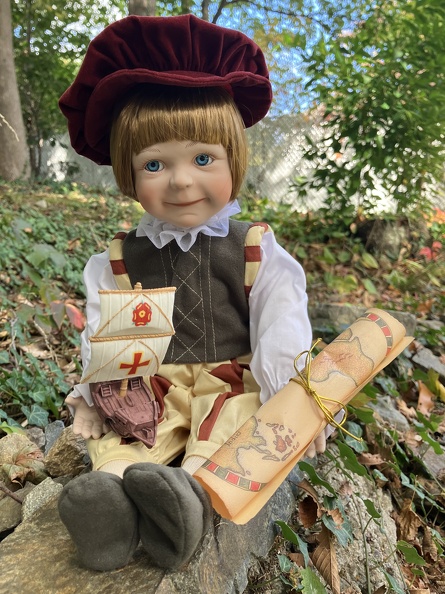
My American Girl dolls decided to organize a little get-together to celebrate Columbus Day.
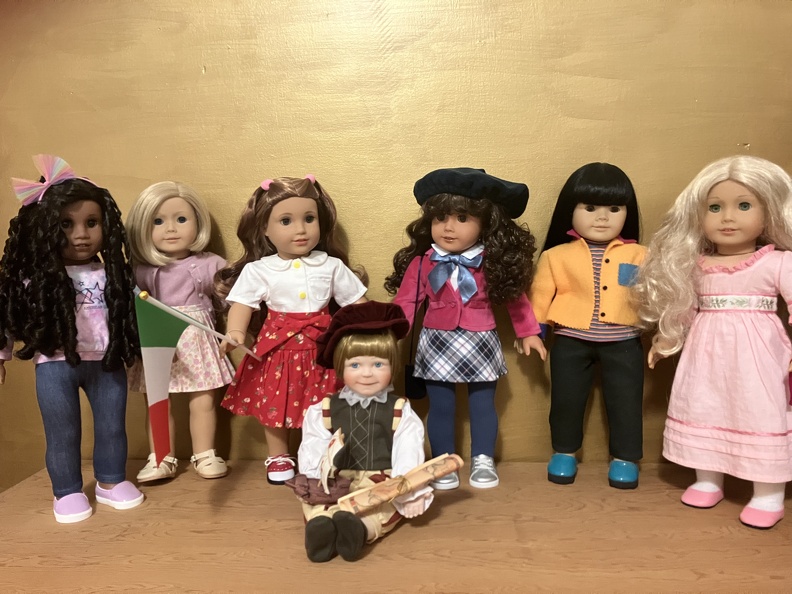
After numerous weeks of lacking the time and energy to do so, I was able to take photos of the beautiful fall leaves, after all. These, for example, were spotted at a local park where I volunteered at an event with my local Republican committee:

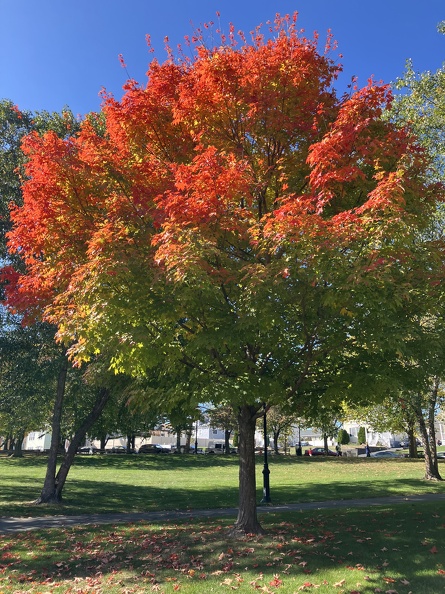
(more photos from this park can be found here)
These were taken at the pond near my house:
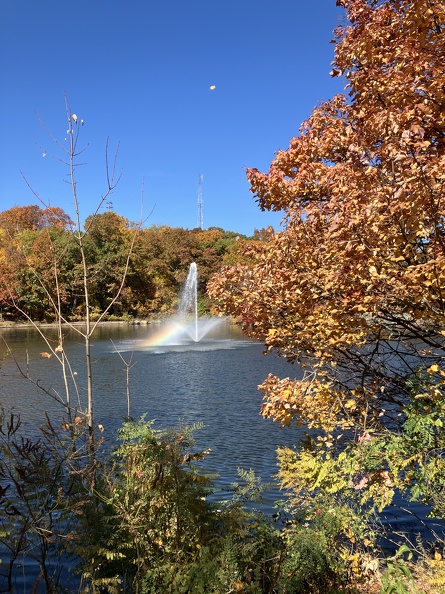

(more photos from the pond can be found here)
And these were taken at a nearby cemetery:

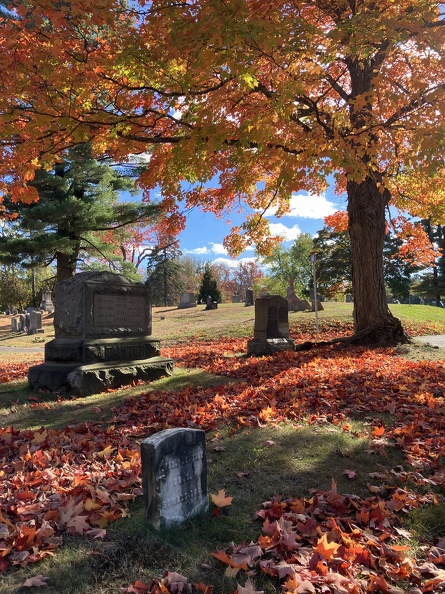
(more photos from the cemetery can be found here)
I don’t have a photo for this next one, but things are looking up, for the moment at least, with my special interest in sports. The winter sports season has started, and the amount of coverage that NBC and its networks are showing appears to actually be manageable (knock on wood). I am currently caught up on figure skating, am almost caught up on horse racing, and am looking forward to the Breeders’ Cup, which is starting today. And miraculously, I have begun the laborious process of going through my backlog of Olympics recordings, something that until recently, made me nauseous to even think about doing. I watched the very beginning of the equestrian and swimming competitions, both of which involved an officiant ceremonially pounding the ground with a staff to signify the official opening of the venues. Even when watching the events three months later, it was beautiful to see the sun shining through the fog in the background of the early morning dressage competition at the Palace of Versailles.
On a different note, I came across these Trump stickers at the parking garage near my work:

Additionally, I finally got a Trump sign, which my little statues wanted to pose with:

Last but not least, my “Mini Lee” arrived at my house! This is a tiny replica of the Charlottesville statue of Robert E. Lee that was sickeningly destroyed. As you can see, I showed him to the bigger statues, and they think he is pretty cool. These are being sold by Monuments Across Dixie to raise money for a full-size recreation of the statue at a location to be determined. If you are interested in getting your own Mini Lee, more info can be found here.
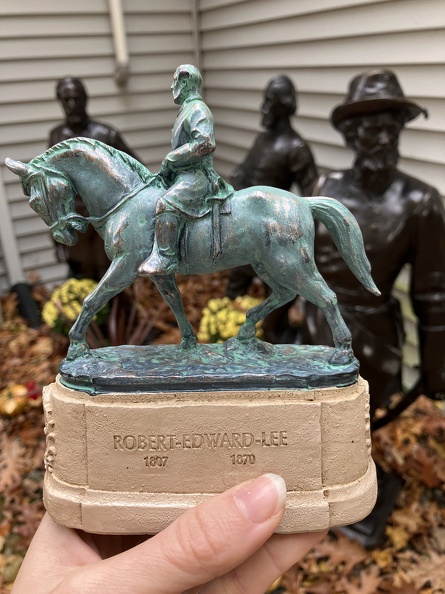
The world often feels like it is trying to make it impossible for me to have a life that is worth living. But I will continue to fight for such a life, one small glimmer of hope at a time.
bookmark_borderDear Tim Walz…
Lately, I have been finding it difficult to go on.
I have been thinking about the idea that everyone has the right to their own perspective, their own viewpoint, their own feelings, their own emotions. Some people would argue that it makes no sense to say that a person’s feelings are wrong, or that someone has no right to feel angry or upset at a situation. According to this way of thinking, if a person is angry or upset at a situation, then they automatically have a right to feel that way, because that is the way that they feel. As a believer in objective moral truth, I am skeptical of this idea. I believe that if something is objectively not bad, then no one has the right to criticize it or feel any negative emotions about it, because to do so is to punish someone who has done nothing wrong.
But I digress. Regardless of which side is right in this philosophical debate, what has bothered me so much about the events of the past four and a half years is that people have not merely felt, or voiced, negative emotions about the historical figures that I love. They have enacted those feelings in ways that have involved the physical destruction of the historical figures. And regardless of one’s feelings about the historical figures that I love, regardless of what one thinks about their merit as historical figures, everyone should agree that physically eradicating historical figures from the earth is wrong. Everyone should agree that disliking someone does not give you the right to murder them.
Yet everyone, clearly, does not agree with this.
I’ve had to watch, through pictures, videos, news reports, and social media posts, the man that I love be strangled, lynched, beheaded, smashed to pieces, drowned, burned. I have had absolutely no power to stop this, to prevent it, to reverse it, to gain any sort of compensation or restitution for that harm that has been done to me. I don’t even have the power to voice my pain and be heard. Because no matter how hard I try, no matter many different ways of explaining I attempt, society refuses to recognize that any harm has been done to me at all. Whenever I try to express my viewpoint, to voice my grief and anger, to present any sort of argument for why what happened was wrong, I am met with insults and ridicule. People call me a racist, an idiot, a moron, say that I should be barred from public spaces, laugh in my face using Facebook’s hideous “laughing face” reaction. When I contact public officials, I am either ignored entirely, or lectured about how I am wrong, and how the murder of the man that I love was a good thing, and how I need to have more empathy for others and to educate myself about the harm caused. The fact that harm was caused to me by the murder of the man that I love is denied and disregarded. The idea of others actually having empathy for me is not even acknowledged as a possibility.
This is why I’m outraged upon coming across the following quote from Tim Walz: “How is it fair that you’re paying your taxes every year, and Donald Trump hasn’t paid any federal tax in the last 15 years?”
Walz’s sentiments are so lacking in empathy that it’s appalling.
After being forced to watch the man that I love be strangled, lynched, beheaded, smashed to pieces, drowned, and burned, dozens upon dozens of times, I don’t care a whit about how much tax money Donald Trump pays. What I care about is the man that I love, and the fact that he was murdered.
Tim Walz, in fact, made a deliberate decision to allow the man I love to be murdered. Tim Walz knew that a group of bigots and bullies were planning to lynch Christopher Columbus at the state capitol building in St. Paul, Minnesota on a particular day and at a particular time. And he ordered the state police to stand down, to do nothing, to make no attempt to stop the lynching. So the man that I love was lynched, brutally and excruciatingly, on the steps of the state capitol, as dozens of cops stood and watched. The images of the noose being tied around his neck, his metal body crashing to the ground, a bigot named Mike Forcia standing on Christopher’s pedestal and thrusting his arms into the air in sickening triumph, mindless bigots posing with their knees on Christopher’s neck as he lay pitifully face down on the ground, a line of cops standing at attention and doing absolutely nothing as these horrifying events took place, are indelibly seared into my mind. The excruciating agony will be with me forever. It burns my consciousness and torments my soul as I type this sentence.
But to Tim Walz, the lynching of the man that I love does not matter. It is not important, not a problem, not worth doing anything about. Tim Walz thinks that the amount of taxes paid by Donald Trump is more important than Christopher’s life, more important than the soul-crushing trauma and pain that I’ve been subjected to.
Lately, my mood has been low and down, my soul feels crushed, and everything feels heavy. For four and a half years I’ve lived with trauma that never goes away, that contaminates nearly every person, organization, place, and activity, that eats at my mind when I’m trying to fall asleep, that erupts into a volcano of anguish at the smallest reminder. And no one cares. Society thinks that the problem is me, that the man I love deserved to be murdered, that I am racist and bad for loving him, and that I need to change so that I’m not as upset about the fact that he was murdered. It’s difficult to imagine a path forward, a life that could be meaningful, given these circumstances.
Meanwhile, the people who lynched the man that I love have faced no negative consequences at all. Their needs are being met, just as they always have been. They haven’t suffered trauma. They are told that they are perfectly fine the way they are (righteous and honorable even, depending on who you ask), that they don’t need to change. They are able to live their lives, spend time with friends and family, love their romantic partners, raise their children, engage in their hobbies, and voice their views without criticism, without insults, without laughing face emojis. Tim Walz is able to campaign for Vice President of the United States with his wife and children by his side, participate in debates, speeches, and interviews on meaningless issues, and almost entirely avoid any accountability for his decision to facilitate the lynching of the man that I love.
In the eyes of society, the people who hurt me, the people who murdered the man that I love, hold the moral high ground. In the eyes of society, I am condemned as shameful, disgusting, and morally bad for having been hurt, and the man I love is ridiculed for having been murdered.
In other words, the person who has done nothing wrong in this situation bears 100% of the negative consequences, and the people who have done something wrong, by causing the horrible situation, bear 0% of the consequences.
Tim Walz, that’s what isn’t fair.

